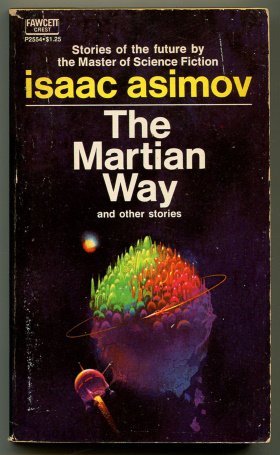Vemadsky closed his eyes and swallowed hard. He knew what Hawkins meant. Vemadsky had deliberately misrepaired a ship, a procedure which could be judged a felony. And death as a result of a felony was murder.
He said, ‘Look, Hawkins, you know why I did it.’
‘I know what you’ve told me and I’ll testify to that if I have to. But if this ship wasn’t smuggling . . . ‘
He didn’t finish the statement. Nor did he have to.
They entered the smashed ship in full spacesuit cover.
The Robert Q. was a shambles, inside and out. Without power, there was no chance of raising the feeblest screen against the rock that hit them or of detecting it in time or of avoiding it if they had detected it. It had caved in the ship’s hull as though it were so much aluminum foil. It had smashed the pilot room, evacuated the ship’s air, and killed the three men on board.
One of the crew had been slammed against the wall by the impact and was so much frozen meat. The captain and the other crewman lay in stiff attitudes, skins congested with frozen bloodclots where the air, boiling out of the blood, had broken the vessels.
Vernadsky, who had never seen this form of death in space, felt sick, but he fought against vomiting messily inside his spacesuit and succeeded.
He said, ‘Let’s test the ore they’re carrying. It’s got to be alive.’ It’s got to be, he told himself. It’s got to be.
The door to the hold had been warped by the force of collision and there was a gap half an inch wide where it no longer met the frame.
Hawkins lifted the counter he held in his gauntleted hand and held its mica window to that gap.
It chattered like a million magpies.
Vemadsky said, with infinite relief, ‘I told you so.’
His misrepair of the ship was now only the ingenious and praiseworthy fulfillment of a citizen’s loyal duty and the meteor collision that had brought death to three men merely a regrettable accident.
It took two blaster bolts to break the twisted door loose, and tons of rock met their flashlights.
Hawkins lifted two chunks of moderate size and dropped them gingerly into one of the suit’s pockets. ‘As exhibits,’ he said, ‘and for assay.’
‘Don’t keep them near the skin too long,’ warned Vemadsky.
‘The suit will protect me till I get it back to ship. It’s not pure uranium, you know.’
‘Pretty near, I’ll bet.’ Every inch of his cockiness was back.
Hawkins looked abou . ‘Well, this tears things. We’ve stopped a smuggling ring, maybe, or part of one. But what next?’
‘The uranium asteroid – uh, oh!’
‘Right. Where is it? The only ones who know are dead.’
‘Space!’ And again Vemadsky’s spirits were dashed. Without the asteroid itself, they had only three corpses and a few tons of uranium ore. Good, but not spectacular. It would mean a citation, yes, but he wasn’t after a citation. He wanted promotion to a permanent Earth-side job and that required something.
He yelled, ‘For the love of space, the silicony! It can live in a vacuum. It lives in a vacuum all the time and it knows where the asteroid is.’
‘Right!’ said Hawkins, with instant enthusiasm. ‘Where is the thing?’
‘Aft,’ cried Vernadsky. ‘This way.’
The silicony glinted in the light of their flashes. It moved and was alive.
Vemadsky’s heart beat madly with excitement. ‘We’ve got to move it, Hawkins.’
‘Why?’
‘Sound won’t carry in a vacuum, for the love of space. We’ve got to get it into the cruiser.’
‘All right. All right.’
‘We can’t put a suit around it with a radio transmitter, you know.’
‘I said all right.’
They carried it gingerly and carefully, their metal-sheathed fingers handling the greasy surface of the creature almost lovingly.
Hawkins held it while kicking off the Robert Q.
* * *
It lay in the control room of the cruiser now. The two men had removed their helmets and Hawkins was shucking his suit. Vemadsky could not wait.
He said, ‘You can read our minds?’
He held his breath until finally the gratings of rock surfaces modulated themselves into words. To Vemadsky no finer sound could, at the moment, be imagined.
The silicony said, ‘Yes.’ Then he said, ‘Emptiness all about. Nothing.’

























